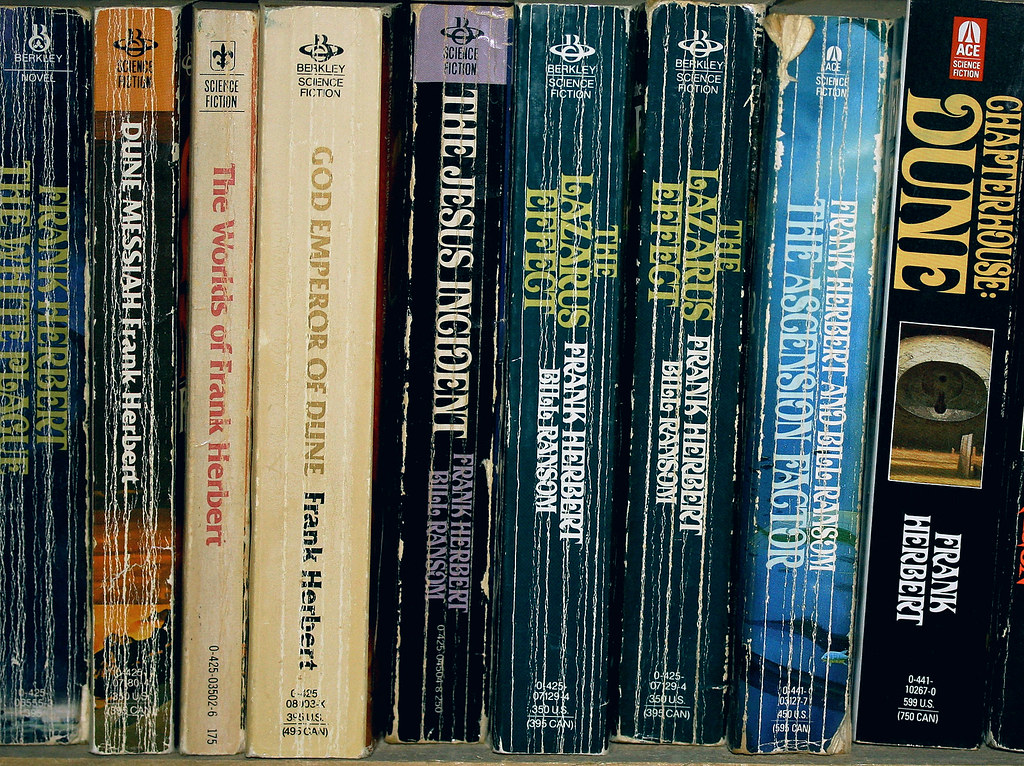This Thursday, director Denis Villeneuve’s adaptation of Frank Herbert’s novel Dune will hit theatres across North America. Villeneuve will try to translate one of the greatest literary works of science fiction into a film of equal quality – a feat that history has proven to be impossible. Frank Herbert’s Dune is infamously dense, lengthy, and complex. Two of cinema’s most ambitious and innovative directors, Alejandro Jodorowsky and David Lynch, have tried to adapt Dune and failed. Now, we’re days away from seeing if Villeneuve has learned from the missteps of his peers.
Dune is a sprawling and commanding text that challenges both filmmakers and general readers. Herbert’s 1965 magnum opus is an 180,000-word, 700-page science fiction epic set in the distant future in a feudal, interstellar society. Herbert himself stated his novel could be read as an allegory for ecology, religion, philosophy, or evolution. We begin with a young nobleman named Paul as his family’s kingdom moves to the desert planet Arrakis, or Dune. We end with a matured Paul becoming a religious prophet and leading a war against his rival noble house. In between, Herbert guides us through the countless societies and individuals all in competition for Arrakis and the invaluable mind-altering drug beneath its sands.
It’s easy to understand why an imaginative filmmaker would be compelled to put Dune on screen. It’s an innately cinematic narrative accompanied by intriguing thematic depths that any artist would love to explore. It’s also easy to see where an eager adapter would stumble. The text has a seemingly boundless vocabulary of places and names accompanied by a story so dense that many critics of the book have called it incomprehensible. If Dune’s story is hard to tell, its setting is harder to shoot. The novel’s desert battles, spaceship palaces, and monstrous sandworms require an immense budget and technical team.
It’s easy to understand why an imaginative filmmaker would be compelled to put Dune on screen. It’s an innately cinematic narrative accompanied by intriguing thematic depths that any artist would love to explore.
Yet, less than a decade after Dune’s release, Chilean-French director Alejandro Jodorowsky set out to make the adaptation he thought could change the landscape of cinema. Jodorowsky is one of the few filmmakers ambitious and uninhibited enough for Dune. His first film, Fando Y Lis, was so graphic that a riot began after the film’s premier. His cryptically unsettling second film El Topo was cinema’s first midnight movie. His script for Dune would have yielded a nearly fourteen-hour movie and his plan walks the tightrope between brilliant and ridiculous.
In the early 1970’s, Jodorowsky travelled around the world assembling what he called the “spiritual warriors” with whom he’d make the movie. Jodorowsky wanted Spanish artist Salvador Dalí to act. Dalí demanded to be the highest paid actor in the history of cinema – $100,000 for each hour on set. Jodorowsky was so determined to have Dalí in Dune that he acquiesced and cast him as the galaxy’s Emperor. To play the conniving and elephantine Baron Harkonnen, Jodorowsky enlisted one of cinema’s greats, Orson Welles. Welles, beyond abdominous at this time, agreed on the condition that a private chef prepare all his meals. For Dune’s illustrations and special effects, Jodorowsky recruited Dan O’Bannon, H.R. Giger, and Chris Foss, all behind-the-scenes experts who’d create the groundbreaking effects on Alien. He had agreements with Pink Floyd for the soundtrack and his cast included Mick Jagger, Gloria Swanson, and his son.
Today Jodorowsky’s Dune is the greatest movie never made.
Jodorowsky was on a mission to make Dune. He had assembled an implausible cohort of the globe’s most acclaimed artists and their larger-than-life personalities. He was determined to have Dune transform the audience’s understanding of what film could be and thus refused to compromise his artistic vision to conform to industry norms. Jodorowsky wouldn’t truncate his fourteen-hour script and Hollywood studios didn’t offer him the necessary funding. Today Jodorowsky’s Dune is the greatest movie never made.
A documentary about the failed adaptation called Jodorowsky’s Dune was released in 2013. We listen to an excited Jodorowsky telling stories about the movie’s pre-production and his meetings with Dalí, Welles, Jagger, and Pink Floyd. The documentary and most Jodorowsky fans accept that his Dune, if properly funded, would have been a landmark achievement. It’s equally probable that a film with a run time of more than a half a day might have been a spectacular failure. We will never know. Dune and the peculiar director who attached himself to it became too ambitious, too strange, and too powerful to make the big screen.
Enter David Lynch. Lynch, like Jodorowsky, was an up-and-coming avant-garde filmmaker in the 1970’s known for his surreal and disturbing films like The Elephant Man and Eraserhead. In 1983, Lynch received the studio funding to adapt Dune and set out to achieve what Jodorowsky never could. Things went wrong quickly. Shooting exclusively in unforgiving deserts in Mexico proved a bad decision and the film went tremendously over-budget. Like Jodorowsky, Lynch fought with studio executives over run time. Warner Brothers wanted the final film to run for a standard two hours but Lynch’s cut was three and half hours.
The released version of Dune is practically unwatchable. Truncating the entirety of Herbert’s Dune into just above two hours generated a film so scattered and incomprehensible that the studio famously distributed glossaries of the Dune universe to help moviegoers understand the plot. The quality falls somewhere between a bad Star Trek episode and an Ed Wood movie, not the work of a cinematic master. Lynch was embarrassed enough to remove his own name from the movie’s credits on subsequent releases.
Today, Jodorowsky and Lynch remain two of cinema’s most acclaimed arthouse directors. They each had monumental plans for what their Dune would accomplish. But they could only watch as their creative visions were dismantled to fit a studio’s bottom line. Now, nearly four decades after Lynch’s Dune, there is a new challenger, attempting to fulfill the dream none of his peers could. And there is reason for optimism that this time, Dune will be done right.
Denis Villeneuve is a French-Canadian director whose science fiction films are both chilling mindbenders and mainstream popcorn hits. His 2016 film Arrival was both a box-office smash that was also called the smartest big-budget sci-fi film in years. Just one year later, he made the star-studded, critically-acclaimed sequel to Blade Runner that garnered the love of science fiction and cinema fans across the world. He consistently pairs the thought-provoking and philosophical possibilities of science fiction with exhilarating spectacle. He is, perhaps, the only person today fit to adapt Dune.
Villeneuve gives us hope. Like Jodorowsky and Lynch, he recognizes that Dune can never be a simple two-hour movie. But Villeneuve did what the others couldn’t and arranged a deal to direct two Dune movies with Warner Brothers. This Dune is only the first half of Herbert’s novel and it will hit theatres in an era where science fiction epics and sequels are one of the highest-selling genres. His cast is an embarrassment of riches featuring stars like Timothée Chalamet, Zendaya and Oscar Isaac, and a score from composer Hans Zimmer.
Denis Villeneuve has the chance to change all of this, to erase the failures his peers endured and make Dune into the film it always deserved to be.
The past forty-five years of literary and cinematic history have brought us to this singular moment in 2021. Two of cinema’s most visionary directors have been unable to rise to the challenge of bringing the most exceptional science fiction text ever penned to the big screen. Denis Villeneuve has the chance to change all of this, to erase the failures his peers endured and make Dune into the film it always deserved to be.


